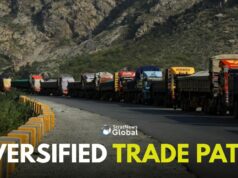President Donald Trump announced that the US will levy nearly 100% tariff on imported semiconductors, but clarified that firms already manufacturing in the country or those that have pledged to set up domestic production will be exempt from this duty.
The move is part of Trump’s efforts to bring manufacturing back to the United States, and his remarks on Wednesday were made in tandem with an announcement that Apple would be investing an additional $100 billion in its home market.
For companies like Apple, which have committed to build in the United States, “there will be no charge,” he told reporters in the Oval Office.
Trump Warns Against Reneging
He warned, however, that companies should not try to wrangle out of pledges to build US factories.
“If, for some reason, you say you’re building and you don’t build, then we go back and we add it up, it accumulates, and we charge you at a later date, you have to pay, and that’s a guarantee,” Trump added.
The comments were, however, not a formal tariff announcement, and much remains unclear about how companies and countries around the world will be impacted.
His remarks produced an immediate flurry of reactions from concerned countries and business lobbies.
Contrasting Sentiments
South Korea’s top trade envoy said on Thursday that major chipmakers Samsung Electronics and SK Hynix will not be subject to 100% tariffs, and South Korea will have the most favourable levies on semiconductors under a trade deal between Washington and Seoul.
On the other end of the spectrum, the president of the Philippine semiconductor industry, Dan Lachica, said Trump’s plan would be “devastating” for his country.
In Malaysia, trade minister Tengku Zafrul Aziz warned parliament his country “will risk losing a major market in the United States if its products become less competitive as a result of the imposition of these tariffs.”
Among those expected to be relatively unscathed is Taiwanese chip contract manufacturer TSMC – which has factories in the United States, so big customers such as Nvidia are unlikely to face increased tariff costs.
Big Companies To Benefit
Nvidia, which makes cutting-edge AI graphics processing units, also plans to invest hundreds of billions of dollars in US-made chips and electronics over the next four years. An Nvidia spokesperson declined to comment for this story.
“Large, cash-rich companies that can afford to build in America will be the ones to benefit the most. It’s survival of the biggest,” said Brian Jacobsen, chief economist at investment advisory firm Annex Wealth Management.
Congress created a $52.7 billion semiconductor manufacturing and research subsidy programme in 2022. The Commerce Department under President Joe Biden last year convinced all five leading-edge semiconductor firms to locate chip factories in the US as part of the programme.
The department said the US last year produced about 12% of semiconductor chips globally, down from 40% in 1990.
“There’s so much serious investment in the United States in chip production that much of the sector will be exempt,” said Martin Chorzempa, senior fellow at the Peterson Institute for International Economics.
He added that chips made by China’s SMIC or Huawei are unlikely to be exempt, but noted that chips from these companies entering the US market were mostly incorporated into devices assembled in China.
“If these tariffs were applied without a component tariff, it might not make much difference,” he said.
Shares Climb
The EU has said it agreed to a single 15% tariff rate for the vast majority of EU exports, including cars, chips and pharmaceuticals. Japan has said that the US agreed not to give it a worse tariff rate than other countries on chips.
Shares in Asian chipmakers with big US investment plans climbed on Thursday, with TSMC and Samsung up 4.4% and 2% respectively. Silicon wafer producer GlobalWafers, which has a plant in Texas, jumped 10%.
Samsung declined to comment on Trump’s remarks. TSMC did not immediately reply to a request for comment. GlobalWafers said it has proactively implemented cost reduction strategies and believes it has an opportunity to maintain competitiveness.
(With inputs from Reuters)





